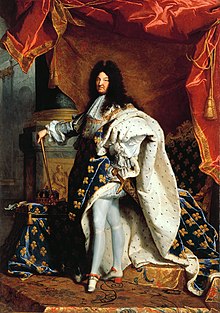
Back Edik van Fontainebleau Afrikaans مرسوم فونتينبلو Arabic Fontenblo edikti Azerbaijani Эдыкт Фантэнбло Byelorussian Едикт от Фонтенбло Bulgarian Edicte de Fontainebleau Catalan Edikt z Fontainebleau Czech Edikt von Fontainebleau German Έδικτο του Φονταινεμπλώ Greek Edikto de Fontainebleau Esperanto


The Edict of Fontainebleau (18 October 1685, published 22 October 1685) was an edict issued by French King Louis XIV and is also known as the Revocation of the Edict of Nantes. The Edict of Nantes (1598) had granted Huguenots the right to practice their religion without state persecution. Protestants had lost their independence in places of refuge under Cardinal Richelieu on account of their supposed insubordination, but they continued to live in comparative security and political contentment. From the outset, religious tolerance in France had been a royal, rather than popular, policy.[1]
The lack of universal adherence to his religion did not sit well with Louis XIV's vision of perfected autocracy.[2]